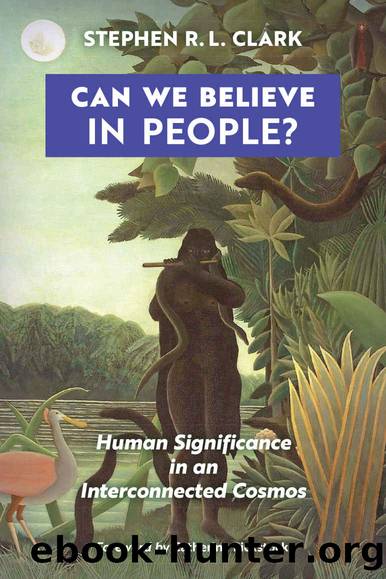Can We Believe in People?: Human Significance in an Interconnected Cosmos by Stephen Clark

Author:Stephen Clark [Clark, Stephen]
Language: eng
Format: epub
Publisher: Angelico Press
Published: 2020-05-12T04:00:00+00:00
6
The Roots of Religion
THE REASON WHY
So let us suppose that God is represented to us in the defenseless, evoking our love rather than our fearful submission. The life we are invited to share, the life that is God, is one of compassion rather than of domination. We are to suppose ourselves made as "images of God," standing as God's representatives â but perhaps we might also consider ourselves "images of Creation," a place where all His Creation is brought before the Lord. Chesterton proposed that we might at least be representative mammals!
We stand as chiefs and champions of a whole section of nature, princes of the house whose cognisance is the backbone, standing for the milk of the individual mother and the courage of the wandering cub, representing the pathetic chivalry of the dog, the humour and perversity of cats, the affection of the tranquil horse, the loneliness of the lion.1
Joseph Ashkenazi of Safed (1525-1572) similarly wrote, "when the midrash puts human beings at the center, it is because we include within us, and stand for, all the creatures of the universe, who are altogether called 'Adam.'"2
The primary meaning of the image of God in the human is that we participate in every being and every level of Being. If so, then all the other creatures also participate in us. Each is somehow part of our humanity, just as each is part of God's name. Cutting ourselves off from the other creatures means cutting off these parts of ourselves, parts of the image of God, just as it means cutting off part of God's name.3
A related point has also been made more recently, in the light of current cosmological research:
The pursuit of natural science is one of the ways in which man, the child of God, fulfils his distinctive function in the creation. That is how, for example, Francis Bacon at the outset of our modern scientific era understood the work of human science as a form of man's obedience to God. Science properly pursued in this way is a religious duty. Man as scientist can be spoken of as the priest of creation, whose office it is to interpret the books of nature written by the finger of God, to unravel the universe in its marvellous patterns and symmetries, and to bring it all into orderly articulation in such a way that it fulfils its proper end as the vast theatre of glory in which the Creator is worshipped and hymned and praised by his creatures. Without man, nature is dumb, but it is man's part to give it word: to be its mouth through which the whole universe gives voice to the glory and majesty of the living God.4
Torrance, in this work, takes his start from evidence of "fine-tuning" in the cosmos as described by Bernard Lovell:
Why is the universe expanding so near the critical rate to prevent its collapse? If the universe had begun to expand in the first few minutes after the explosion of its original
Download
This site does not store any files on its server. We only index and link to content provided by other sites. Please contact the content providers to delete copyright contents if any and email us, we'll remove relevant links or contents immediately.
The Lonely City by Olivia Laing(4154)
Animal Frequency by Melissa Alvarez(3784)
All Creatures Great and Small by James Herriot(3556)
Walking by Henry David Thoreau(3263)
Exit West by Mohsin Hamid(3226)
Origin Story: A Big History of Everything by David Christian(3170)
COSMOS by Carl Sagan(2981)
How to Read Water: Clues and Patterns from Puddles to the Sea (Natural Navigation) by Tristan Gooley(2910)
Hedgerow by John Wright(2803)
The Inner Life of Animals by Peter Wohlleben(2793)
Origin Story by David Christian(2715)
How to Read Nature by Tristan Gooley(2690)
Project Animal Farm: An Accidental Journey into the Secret World of Farming and the Truth About Our Food by Sonia Faruqi(2684)
How to Do Nothing by Jenny Odell(2670)
Water by Ian Miller(2620)
A Forest Journey by John Perlin(2611)
The Plant Messiah by Carlos Magdalena(2478)
A Wilder Time by William E. Glassley(2384)
Forests: A Very Short Introduction by Jaboury Ghazoul(2358)
